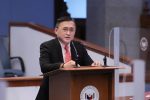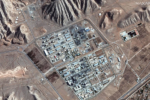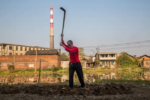Senator Go supports bill providing fix SRA to health workers
FILE PHOTO
Senator and Chair of the Senate Committee on Health Christopher “Bong” Go expressed his support for a proposal to introduce a fixed monthly Special Risk Allowance (SRA) for both public and private healthcare workers (HCWs) who physically report for duty in hospitals and other health facilities amid the COVID-19 pandemic.
Go urged concerned authorities to provide a certain level of flexibility in the implementation of the provisions of the Bayanihan to Recover As One Act which provides the legal basis for the provision of SRA.
“Bigyan natin ng sapat na suporta ang medical frontliners. Bawat araw ay nasa panganib ang kanilang buhay. Siguraduhin nating mabibigyan ang lahat ng qualified healthcare workers ng Special Risk Allowance at iba pang insentibo o benepisyo na naaayon sa batas,” appealed Go.
“Kaya ako umaapela na maging flexible tayo sa pag-iimplementa ng nakasaad sa batas at kung kakayanin ng pondo ay bigyan na ang lahat nang qualified ng fixed na amount ng SRA kaysa bilangin pa natin ang kanilang pag-duty bawat araw,” he added.
At present, all HCWs who are directly catering to or in contact with COVID-19 patients receive an SRA not exceeding P5,000 per month. The allowance is pro-rated based on the number of days that they physically reported for work, pursuant to Administrative Order No. 42 which President Rodrigo Duterte signed last June 1.
To ensure their contributions and the risks they face are sufficiently recognized, Go also gave his support for expanding the provision of the SRA to all HCWs serving in the hospitals. He pointed out that almost all HCWs fall within the scope of the law’s definition given the high number of COVID-19 cases admitted in the country’s health care facilities.
“Lahat naman ng health workers na naka-duty ay maituturing na exposed sa banta ng COVID-19. Hindi nakikita ang kalaban na ito kung kaya’t mahirap paghiwalayin pa kung sino ang exposed at sino ang hindi,” continued Go.
“‘Pagdating mo sa ospital, ‘di mo naman masasabi. Once nasa loob ka na, prone at maituturing na exposed ka na rin. Hindi mo masabi na walang virus sa dinaanan mong floor dahil dito lang ang virus kasi hindi nga natin nakikita ang kalaban,” he explained in an earlier interview.
Go added that the government must provide all the support they can to medical frontliners given their crucial role in fighting the pandemic and in saving lives.
“As much as possible, kung kakayanin naman ng pondo, ibigay na natin lahat ng suportang pwede nating ibigay sa medical frontliners dahil sila naman ang maituturing na mga bayani sa laban na ito,” Go stressed.
“Hindi natin masusukat ang panganib na hinaharap nila base sa ilang araw sila in direct contact sa may sakit. Dahil habang nasa duty sila at nag-aalaga sila ng may sakit, considered at risk na po sila,” he added.
The Senator proceeded to remind the Department of Health and the Department of Budget and Management to make sure the relevant benefits are sufficiently and immediately disbursed to the HCWs as provided by the law.
As the chair of the Senate Committee on Health and vice chair of the Senate committee on Finance, Go vowed to ensure that the necessary funds are available in the 2022 national budget for the continuous provision of the SRA and other related benefits for health workers.
“Kapag dumating ‘yan sa amin sa Senado ay tutulong ako na mahanapan ng paraan na mabigyan sila ng pondo papunta next year kasi ayaw kong ma-low morale ang ating health workers. Ipaglalaban ko ang kapakanan nila palagi,” vowed Go.
“Tandaan natin na bukod sa mga pasyenteng inaalagaan nila, may mga pamilya rin silang binubuhay. Maging patas tayo sa mga health workers na dapat makatanggap ng benepisyo,” he stressed
The DOH recently disclosed that it initially proposed to the DBM a total of P50.4 billion for 365,000 public and private health workers and their COVID-19 SRA, hazard pay, transport, insurance, accommodation or meals for a period of 12 months. The SRA has a funding requirement of P18.03 billion or P1.5 billion per month for a total of 300,500 health workers.






